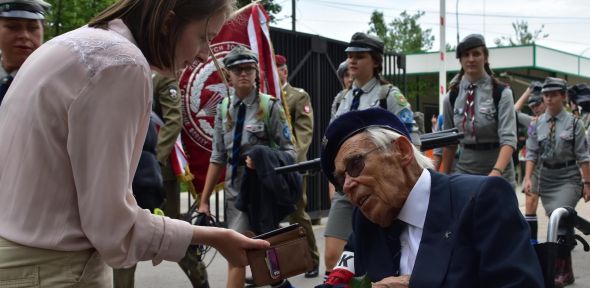
Photo: Juliette Bretan recording an interview with Warsaw Uprising survivor Bohdan Dembiński.
By Juliette Bretan
I am writing this as I return from a fascinating, thought-provoking and lively month in the Polish capital, during which I gained extremely useful experience reporting on Polish current affairs and culture for a variety of publications. I was incredibly lucky that the time I spent this year across those dazzlingly sunny days of Warsaw’s August were jam-packed with opportunities to develop my journalism career in a more social and political field, alongside additional research in my cultural spheres of interest – all accompanied by the near-constant, almost veloured sound of Polish tango, which pulsates through the city’s streets every summer, and which I love so dearly. I am incredibly grateful for the support offered for the trip by Cambridge Polish Studies, without which I would have been unable to fulfil these internship opportunities towards my future career, and expand my understanding of the region.
I began working in Warsaw for the Res Publica Foundation, a think tank which publishes the debate-focused Visegrad Insight, as well as fostering policy analysis across the Visegrad Four. From building on my editorial and language experience in proof-reading and translating articles and content for the website, to working in a completely different field using economic data to record trends for the upcoming EU MFF budget, I was also able to pitch article topics for publication. Perched on one knee in between dusty crowds of scouts and journalists at the entrance to Cmentarz Wojskowy on 1st August, I had the privilege of interviewing 96-year-old Warsaw Uprising survivor Bohdan Dembiński, whose story and views regarding contemporary Polish commemoration became the backbone of a piece on the politics of memory for Visegrad Insight.
A few days later, I was able to cover another event, this time at Warsaw’s enchanting Miniature Park: the much-anticipated opening of their model of the city’s Great Synagogue, a once venerated hub of Jewish life and Polish-Jewish relations in Warsaw – until it was brutally razed, along with so much other Jewish culture, from the cityscape in 1943. I wrote up the opening for The First News, allowing me to gain experience of reporting and interviewing on the ground to a short deadline, as well as expanding my knowledge of Jewish history and Polish-Jewish friendship in the capital. The strength of feeling and celebration at the opening testifies, I hope, to strengthening relations in future years.
But my journalism opportunities this summer also took me far from the reverent commemorations of Warsaw’s history – more specifically, they led me down into the deliciously boozy bronze-cut bowels of the city’s latest restaurant trend: the revival of interwar gastronomy. In speakeasy-style, these soft-lit bars and restaurants which have cropped up across the city are drawing on the ambitious culinary traditions of eighty-years hence, when the diversity of the pre-war Polish population flavoured food and alcohol consumption. I am always eager to cover stories which combine my appetite for interwar culture with contemporary developments referencing this period, and was fascinated to learn more about the Polish gastronomy sector in the process.
I spent the last weeks of my time in Warsaw ‘back home’ in the comforting offices of Culture.pl, who I am already incredibly lucky to be able to write for, and where I interned last summer. I was overjoyed to take my place again in the cheery Wednesday morning Culture.pl English section meetings, in which undiscovered or forgotten gems of Polish culture – including my ideas on all things interwar – are identified and explored with interest. Refreshed by my time in Warsaw after an intense final year in Cambridge, I am now continuing my work on those future articles.
But even as I neared the end of my time in Warsaw, another impromptu invitation meant I found myself on my way to the College of Europe in Natolin as an invited speaker, to talk with the newly-arrived students about interwar Poland. I was utterly delighted to receive such a prestigious invitation, which also included a private tour of Natolin palace, rarely opened to the public. My interest in interwar culture was sparked almost by chance, but to be able to contribute to the revival and international recognition of the art, literature and enthralling music which effervesced from that era – and to have the honour of taking these stories to such eminent locations – will always be one of my proudest experiences. Without the support of Cambridge Polish Studies, I would have been unable to fulfil this incredible invitation.
And although perpetually fascinating, all work aside, I was able to fully immerse myself in those gorgeous Warsaw summer days through numerous events across the city. I was an almost-permanent attendee at concerts held as part of the Warsaw Singer Festival, in which I almost fell in love all over again with Polish tango courtesy of the modern musicians still playing on today, but I also visited many other museums and events – the latter of which are almost always free, but certainly always enjoyable.
From the first time I visited Warsaw as a tourist in the early 2010s, I completely fell in love with the city, and with Polish culture. Though the Polish and Eastern European heritage of my genealogy was never tangible in my childhood as a result of my Poland-born grandparents’ choice to forget their origins after their move to the UK in 1947, with the support of the Cambridge Polish Studies Programme, I feel I am on my way to reviving some of the dwindling Polish roots in our melting-pot family tree, after so many years of neglect. In the very first days I spent in Cambridge as an English Undergraduate, when I reached out to Dr Stanley Bill and the Polish Studies department to enquire whether I would be able to join his classes to begin to expand my knowledge of Poland, I was able to cultivate the seed of interest in Poland I knew I always had in part, to the extent to which now I know I would like to pursue a career focusing on the country. I know this would have been impossible without the continued support and encouragement I received from the Polish Studies Programme, to which I am always so very grateful. As Adam Aston sang for Syrena Records in 1938: “Dziękuję ci, Za wszystko ci dziękuję!”




